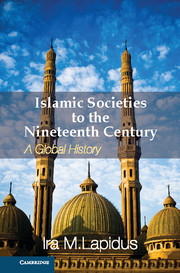Book contents
- Frontmatter
- Contents
- List of Illustrations
- List of Figures
- List of Maps
- List of Tables
- Preface
- Acknowledgments
- Acknowledgments to the first edition of A History of Islamic Societies
- Acknowledgments to the second edition of A History of Islamic Societies
- Publisher's Preface
- Introduction to Islamic Societies
- Part I The Beginnings of Islamic Civilizations
- The Middle East from c. 600 TO c. 1000
- Chapter 1 Middle Eastern Societies Before Islam
- The Preaching of Islam
- The Arab-Muslim Imperium (632–945)
- Cosmopolitan Islam: The Islam of The Imperial Elite
- Urban Islam: The Islam of Scholars and Holy Men
- Women, Families, and Communities
- Part II From Islamic Community to Islamic Society
- Part III The Global Expansion of Islam from the Seventh to the Nineteenth Centuries
- Glossary
- Bibliography
- Annotated Bibliography from A History of Islamic Societies, 2nd Edition
- Index
Chapter 1 - Middle Eastern Societies Before Islam
Published online by Cambridge University Press: 05 February 2013
- Frontmatter
- Contents
- List of Illustrations
- List of Figures
- List of Maps
- List of Tables
- Preface
- Acknowledgments
- Acknowledgments to the first edition of A History of Islamic Societies
- Acknowledgments to the second edition of A History of Islamic Societies
- Publisher's Preface
- Introduction to Islamic Societies
- Part I The Beginnings of Islamic Civilizations
- The Middle East from c. 600 TO c. 1000
- Chapter 1 Middle Eastern Societies Before Islam
- The Preaching of Islam
- The Arab-Muslim Imperium (632–945)
- Cosmopolitan Islam: The Islam of The Imperial Elite
- Urban Islam: The Islam of Scholars and Holy Men
- Women, Families, and Communities
- Part II From Islamic Community to Islamic Society
- Part III The Global Expansion of Islam from the Seventh to the Nineteenth Centuries
- Glossary
- Bibliography
- Annotated Bibliography from A History of Islamic Societies, 2nd Edition
- Index
Summary
Islamic societies were built on the framework of already established and ancient Middle Eastern civilizations. From the pre-Islamic Middle East, Islamic societies inherited a pattern of institutions that would shape daily life until the modern age. These institutions included small communities based on family, lineage, clientage, and ethnic ties; agricultural and urban societies, market economies, monotheistic religions, and bureaucratic empires. Along with their political and social characteristics, Islamic societies also inherited many of the religious, literary, and artistic practices of the pre-Islamic past. The civilization of Islam, although initiated in Mecca, also had its precursors in Palestine, Babylon, and Persepolis.
Islamic societies developed in an environment that since the earliest history of mankind had exhibited two fundamental and enduring qualities. The first was the organization of human societies into small, often familial groups. The earliest hunting and gathering communities lived and moved in small bands. Since the advent of agriculture and the domestication of animals, the vast majority of Middle Eastern peoples have lived in agricultural villages or in the tent camps of nomadic pastoralists. Even town peoples were bound into small groups by ties of kinship and neighborhood, with all that implies of strong affections and hatreds. These groups raised the young, arranged marriages, arbitrated disputes, and formed a common front vis-à-vis the outside world.
- Type
- Chapter
- Information
- Islamic Societies to the Nineteenth CenturyA Global History, pp. 7 - 25Publisher: Cambridge University PressPrint publication year: 2012



